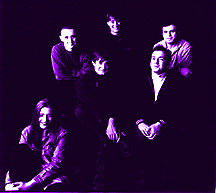Carry Up the Charts
Beautiful South closes its current tour in San Francisco,
October 29-30, at the Great American Music Hall.Don't hate them,
they're the Beautiful South
By Todd S. Inoue
You don't have to be British to appreciate the intelligent, disturbing humor of the public television program, The Black Adder and its satirical drubbing of English history. Many American pop-music fans have also taken to a British band that pleases in the same way: the Beautiful South. Like the television show, the Beautiful South conjures up an exquisite canvas colored with lurid lyricism and ironic commentary.
The band's abilities are best sampled on its recent import-only singles collection, Carry On Up The Charts. The collection is tidy proof that the band is too relevant to be stuck in the import CD-bin ghetto for long.
If the Beautiful South escapes the import fringe, it will be a second coming of sorts: Its American label, Elektra, dropped the Beautiful South three years ago; many American fans from the early days who haven't kept up with the band during its stateside exile may be unaware that backup singer Briana Corrigan has been replaced by Jacqueline Abbott.
Both are well-represented on Carry On Up The Charts. The high-pitched squeak of Corrigan carries the laconic "Bell-Bottomed Tear" and adds saucy commentary to "A Little Time." Abbott's warmer, huskier tones give life to a swirling version of Neil Diamond's "Everybody's Talking."
But it is clearly Paul Heaton's impassioned vocal that makes the Carry On a true pop fan's dream. Heaton is the George Best of British pop: slightly polluted by smoke and drink, but talented beyond compare. You simply don't know whether to laugh or twinge at the wry lyrics belted by a soulful, distinctly British mid-range. "But Til Then," showcases Heaton's timing and meter. His amazing gospel choir-like timbre yanks a tear out of "Let Love Speak Up Itself" and on an acoustic version of Bill Withers' "You Just Can't Smile It Away."
The band's habit of covering tunes by M.G. Greaves (a little-known but skilled country & western singer from the band's hometown of Hull) is acknowledged with the inclusion of three Greaves-penned sparklers: "Diamonds," "Frank and Dolores" and "One Man's Rubbish." The band's skill at conveying irony in a frothy pop context is endearing. The slyness starts with the title, a reference to the Carry On series of randy, comedic films--and a clue to the band's skewed take on the music industry.
It's easy to get lost in the tender melodies set to their jangly, angular arrangements. Many of the "love" songs are cloaked in standard pop love song fluff--impassioned vocals, heightened strings, lithe bass. The lyrics, however, impart a 180-degree head turn worthy of Linda Blair. The tender "Prettiest Eyes" crosses seemingly familiar lovelorn territory, except its protagonists are both over 60 years old. The unrequited tone of "I'll Sail This Ship Alone" ends with Heaton stating that if he burned himself alive "you'd come running back." The best example of South's penchant toward courtship and desire is the calypso-influenced "Size," a gruesome anti-love song that could have been produced by Merchant/Ivory and Quentin Tarantino. Drenched in cheery major keys, nagging questions beleaguer a diminutive suitor: "If size isn't everything, and I'm half his size/How come it's him who gets to keep the prize/But you fuck long and you fuck slow/but you fuck like a walrus smoking blow." The Beautiful South believe in love, but behind every tongue kiss is the potential exchange of germs.
Another favorite technique of the Beautiful South is to break down the third wall and take an occasional stab (nay, plunge) at the record industry. But instead of constantly banging someone over the head with ideology, the Beautiful South does it with unfussed affection and clever metaphorical twists. The dainty strings on "Song For Whoever" convey a lush romanticism, but the lyrics speak of a vain songwriter and the tears he must wrench from his girlfriends' eyes in order to create another number-one single.
"His Time Ran Out" could become a national anthem of pop's dismal state, telling of artists who were going to create the ultimate work, but whose pens ran out of ink. The rollicking "My Book" ends with a jab at the mindless Top 40 acts (in this case, Soul II Soul). "One Last Love Song" vivisects the industry in a snide tune that Morrissey can only dream of duplicating.
The irony is that Beautiful South's future is looking up. The band recently got picked up by Mercury Records, who have released Carry On Up The Charts.
The Beautiful South's first tour since 1990 ends in San Francisco, October 29-30, at the Great American Music Hall.[ Metro | Metroactive Central ]
Web exclusive to the Oct. 26-Nov. 2, 1995 issue of Metro
This page was designed and created by the Boulevards team.
Copyright
© 1995 Metro Publishing and Virtual Valley, Inc.

